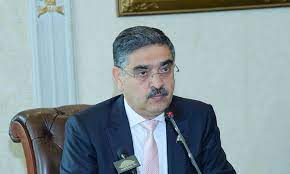Caretaker Prime Minister Anwaar-ul-Haq Kakar once again reaffirmed the government’s resolve to ensure equal rights for minority communities and called for enforcing meritocracy and social opportunities for their uplift and mainstreaming.
During an interaction with the students of Aga Khan University the Premier noted that the people of Pakistan enjoyed freedom of expression, and considering the country’s political history, any particular incident could not be associated with the government of that particular term. On rights and the status of Gilgit Baltistan, the Premier said that the GB was and would remain part of Pakistan. The political procedure should move forward and the matter of rights should be tackled peacefully without any resentment.
The issue of freedom of expression and minorities’ rights is a global phenomenon that exists in all nations and all parts of the globe in one or another way. The civic rights of the citizens including minorities had been comprehensively covered by Islam and vigorously protected by the Muslim rulers in the Riasaat-e-Madina and afterwards. Similarly, those divine values were endorsed by the comity of civilized nations under the UN Universal Declaration of Human Rights in 1948.
However, the issues of human and minority rights still exist unaddressed in all parts of the world including the United States, the UK, Europe, Asia, and Africa. As of now, hate crimes and anti-migrant racism are on the rise in Western nations while the UK’s authorities are currently considering the annulment of Great Britain’s domestic human rights laws along with an exit from the European Convention on Human Rights to tackle the issue of illegal migration, economic and security challenges in their country.
The constitution of Pakistan categorically covers all citizenry and the fundamental rights of its citizens without any discrimination of religion, caste, colour, or creed, while the state of Pakistan has always endeavoured wholeheartedly to protect civil liberties and the basic rights of its populace throughout the past.
However, there had been a sense of insecurity and deprivation among the religious and ethnic minorities including Sindhis, Baloch, FATA, and residents of Gilgit Baltistan, the less developed/ neglected regions. Historically, that resentment had been categorically exploited by the anti-state elements and foreign pawns to their advantage, while the sloganeering about Sindhu Dash and Lar-oO-Bar Afghans is the outcome of that subversion and propaganda. On the other hand, the racial and ethnic politics of regional leaders promoted religious and ethnic polarization and deepened the sense of inequality, discrimination, and exclusion among the masses in those particular regions.
In fact, human rights and civil liberties are sensitive issues that often bisect security concerns and overlap state laws complicating the work of law enforcers and creating hurdles for judges and prosecutors in almost all nations across the globe.
All nations offer a degree of freedom of expression, the right to peaceful assembly, and lawful protest but no country permits any person or a group to abuse the writ of the state or spread chaos and anarchy in any garb. Realistically, nations always grow and societies strengthen through impartial justice, non-discrimination, fairness, and transparency, which are undeniable needs of each citizen, political, religious, and ethnic group in the society.
Fundamental rights are a serious issue that merits careful handling by policymakers to address genuine issues of the public by providing equal economic and financial resources and development opportunities in less developed regions. Efforts should be made to create diverse national perspectives by combating intolerance, fostering unity, and promoting pluralism to foil foreign conspiracies against the country.







